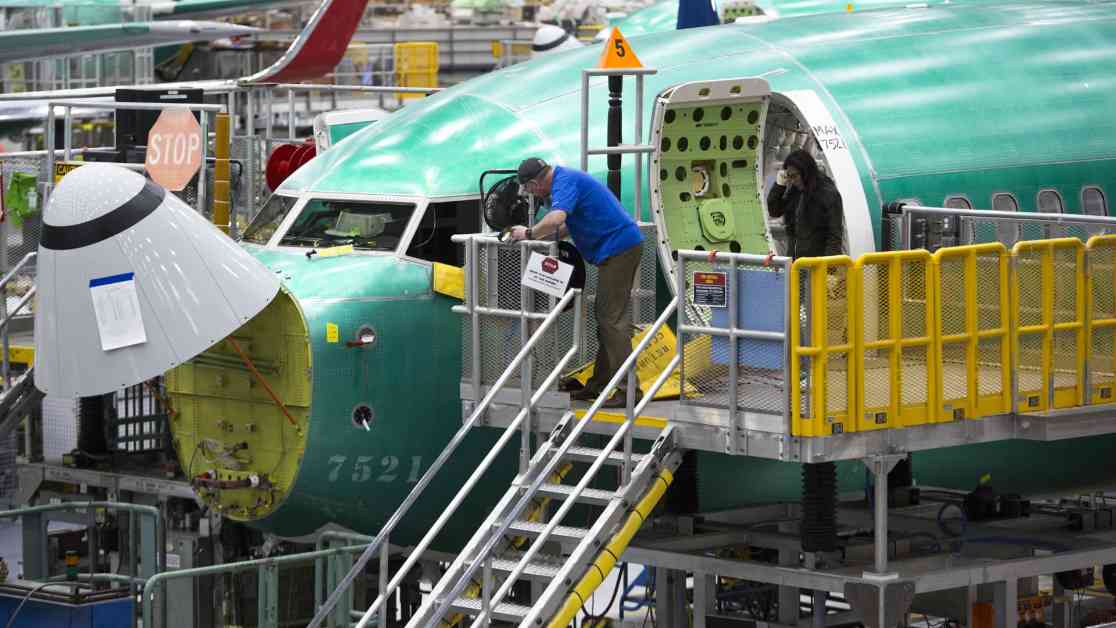Boeing Workers Vote on New Contract Amid Potential Strike Threat
Boeing workers are currently in the process of voting on a new labor contract that could potentially lead to a strike, posing a significant threat to the struggling aircraft manufacturer’s recovery efforts. The outcome of this vote will have far-reaching implications not only for Boeing but also for its employees, suppliers, and the aviation industry as a whole.
The tentative agreement between the International Association of Machinists and Aerospace Workers and Boeing, which was unveiled recently, includes a 25% wage increase along with other enhancements to health-care and retirement benefits. Additionally, Boeing has committed to building its next aircraft in the Seattle area, a move that aims to bolster job security in the region. However, some workers have expressed dissatisfaction with the proposed contract, citing the rising cost of living in the Seattle area as a key concern.
The vote represents a critical juncture for CEO Kelly Ortberg, who assumed the top position at Boeing just over a month ago. Ortberg’s leadership will be put to the test as he navigates the delicate negotiations with the union and strives to maintain stability in aircraft production amidst ongoing safety challenges.
In a staff note to employees, Ortberg acknowledged the passionate response to the tentative agreement and urged workers to consider the long-term implications of their decision. He emphasized the importance of securing Boeing’s future together, despite the frustrations of the past. The outcome of the vote will not only impact the immediate financial health of the company but also its ability to rebuild trust with customers and chart a sustainable path forward.
Potential Economic Impact of a Strike
Analysts have weighed in on the potential economic impact of a strike at Boeing, with estimates suggesting a significant financial blow to the company. Jefferies aerospace analyst Sheila Kahyaoglu projected that a 30-day strike could result in a $1.5 billion hit to Boeing’s cash reserves and disrupt supplier networks. The repercussions of a prolonged strike could ripple through the aviation industry, affecting not only Boeing but also its partners and competitors.
The union, representing approximately 33,000 Boeing factory workers in the Seattle area and Oregon, had initially sought a higher pay raise of 40% from the company. While the proposed 25% increase falls short of this demand, it aligns with recent labor agreements in other industries, such as the United Auto Workers’ deal with major automakers. The decision to accept or reject the contract reflects the complex balance of priorities for Boeing workers, who must weigh immediate financial gains against the potential risks of a strike.
Negotiating a Path Forward
The negotiations between Boeing and the IAM represent a pivotal moment for both parties, marking the first negotiated contract in 16 years. IAM District 751 President Jon Holden emphasized the union’s recommendation to accept the tentative agreement as a pragmatic choice to secure incremental gains for workers. However, he also acknowledged the autonomy of workers to make their own decision and affirmed the union’s support for their choice, whether it leads to a strike or an approved contract.
Top pay for IAM workers at Boeing would see a substantial increase under the proposed contract, with hourly rates rising to $57.43 and average annual pay reaching $106,350 by the end of the four-year agreement. These figures highlight the significant impact that the negotiated terms could have on the financial well-being of Boeing employees, many of whom have weathered economic challenges in recent years.
The looming threat of a strike underscores the broader challenges facing Boeing as it seeks to recover from past setbacks and regain market confidence. Ortberg’s plea for unity and collaboration resonates with the urgency of the situation, as a strike could further erode trust in the company and hinder its ability to navigate a complex and competitive industry landscape.
Conclusion
As Boeing workers cast their votes and await the outcome of the contract negotiations, the fate of the company hangs in the balance. The decision to accept or reject the proposed terms will have ripple effects across the aviation industry, impacting not only Boeing’s financial health but also its relationships with employees, suppliers, and customers. The path forward remains uncertain, but one thing is clear: the stakes are high, and the decisions made in the coming days will shape the future of Boeing and its workforce.






















